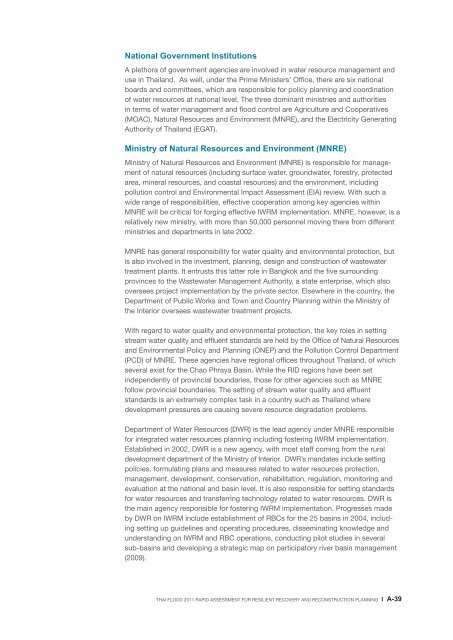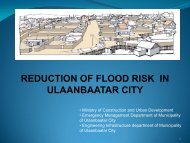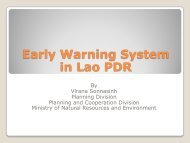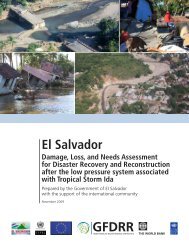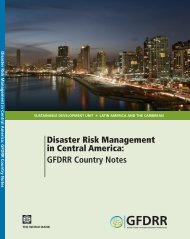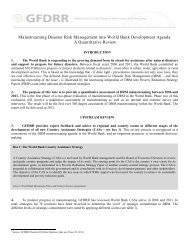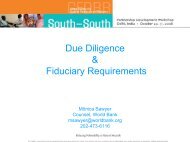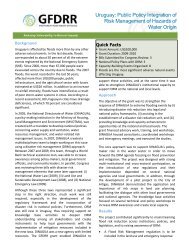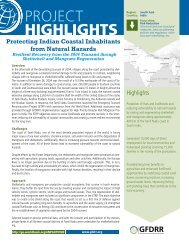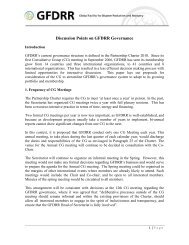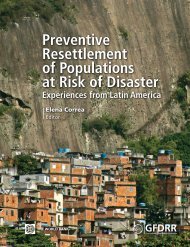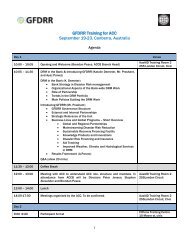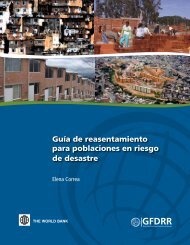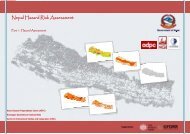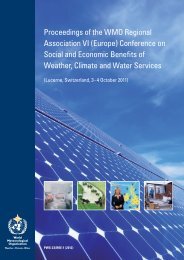Rapid Assessment for Resilient Recovery and ... - GFDRR
Rapid Assessment for Resilient Recovery and ... - GFDRR
Rapid Assessment for Resilient Recovery and ... - GFDRR
You also want an ePaper? Increase the reach of your titles
YUMPU automatically turns print PDFs into web optimized ePapers that Google loves.
National Government Institutions<br />
A plethora of government agencies are involved in water resource management <strong>and</strong><br />
use in Thail<strong>and</strong>. As well, under the Prime Ministers’ Office, there are six national<br />
boards <strong>and</strong> committees, which are responsible <strong>for</strong> policy planning <strong>and</strong> coordination<br />
of water resources at national level. The three dominant ministries <strong>and</strong> authorities<br />
in terms of water management <strong>and</strong> flood control are Agriculture <strong>and</strong> Cooperatives<br />
(MOAC), Natural Resources <strong>and</strong> Environment (MNRE), <strong>and</strong> the Electricity Generating<br />
Authority of Thail<strong>and</strong> (EGAT).<br />
Ministry of Natural Resources <strong>and</strong> Environment (MNRE)<br />
Ministry of Natural Resources <strong>and</strong> Environment (MNRE) is responsible <strong>for</strong> management<br />
of natural resources (including surface water, groundwater, <strong>for</strong>estry, protected<br />
area, mineral resources, <strong>and</strong> coastal resources) <strong>and</strong> the environment, including<br />
pollution control <strong>and</strong> Environmental Impact <strong>Assessment</strong> (EIA) review. With such a<br />
wide range of responsibilities, effective cooperation among key agencies within<br />
MNRE will be critical <strong>for</strong> <strong>for</strong>ging effective IWRM implementation. MNRE, however, is a<br />
relatively new ministry, with more than 50,000 personnel moving there from different<br />
ministries <strong>and</strong> departments in late 2002.<br />
MNRE has general responsibility <strong>for</strong> water quality <strong>and</strong> environmental protection, but<br />
is also involved in the investment, planning, design <strong>and</strong> construction of wastewater<br />
treatment plants. It entrusts this latter role in Bangkok <strong>and</strong> the five surrounding<br />
provinces to the Wastewater Management Authority, a state enterprise, which also<br />
oversees project implementation by the private sector. Elsewhere in the country, the<br />
Department of Public Works <strong>and</strong> Town <strong>and</strong> Country Planning within the Ministry of<br />
the Interior oversees wastewater treatment projects.<br />
With regard to water quality <strong>and</strong> environmental protection, the key roles in setting<br />
stream water quality <strong>and</strong> effluent st<strong>and</strong>ards are held by the Office of Natural Resources<br />
<strong>and</strong> Environmental Policy <strong>and</strong> Planning (ONEP) <strong>and</strong> the Pollution Control Department<br />
(PCD) of MNRE. These agencies have regional offices throughout Thail<strong>and</strong>, of which<br />
several exist <strong>for</strong> the Chao Phraya Basin. While the RID regions have been set<br />
independently of provincial boundaries, those <strong>for</strong> other agencies such as MNRE<br />
follow provincial boundaries. The setting of stream water quality <strong>and</strong> effluent<br />
st<strong>and</strong>ards is an extremely complex task in a country such as Thail<strong>and</strong> where<br />
development pressures are causing severe resource degradation problems.<br />
Department of Water Resources (DWR) is the lead agency under MNRE responsible<br />
<strong>for</strong> integrated water resources planning including fostering IWRM implementation.<br />
Established in 2002, DWR is a new agency, with most staff coming from the rural<br />
development department of the Ministry of Interior. DWR’s m<strong>and</strong>ates include setting<br />
policies, <strong>for</strong>mulating plans <strong>and</strong> measures related to water resources protection,<br />
management, development, conservation, rehabilitation, regulation, monitoring <strong>and</strong><br />
evaluation at the national <strong>and</strong> basin level. It is also responsible <strong>for</strong> setting st<strong>and</strong>ards<br />
<strong>for</strong> water resources <strong>and</strong> transferring technology related to water resources. DWR is<br />
the main agency responsible <strong>for</strong> fostering IWRM implementation. Progresses made<br />
by DWR on IWRM include establishment of RBCs <strong>for</strong> the 25 basins in 2004, including<br />
setting up guidelines <strong>and</strong> operating procedures, disseminating knowledge <strong>and</strong><br />
underst<strong>and</strong>ing on IWRM <strong>and</strong> RBC operations, conducting pilot studies in several<br />
sub-basins <strong>and</strong> developing a strategic map on participatory river basin management<br />
(2009).<br />
THAI FLOOD 2011 RAPID ASSESSMENT FOR RESILIENT RECOVERY AND RECONSTRUCTION PLANNING<br />
A-39


